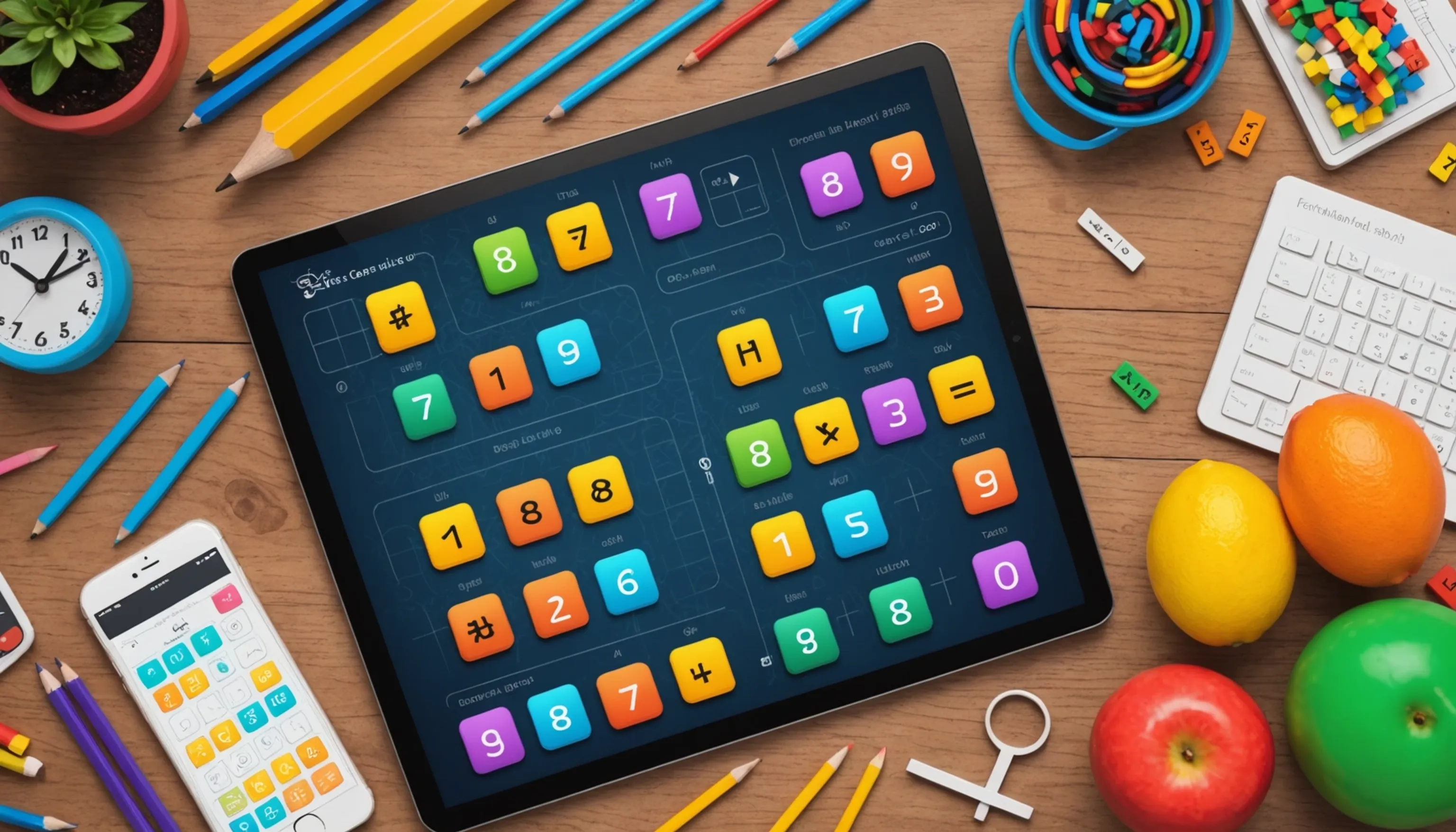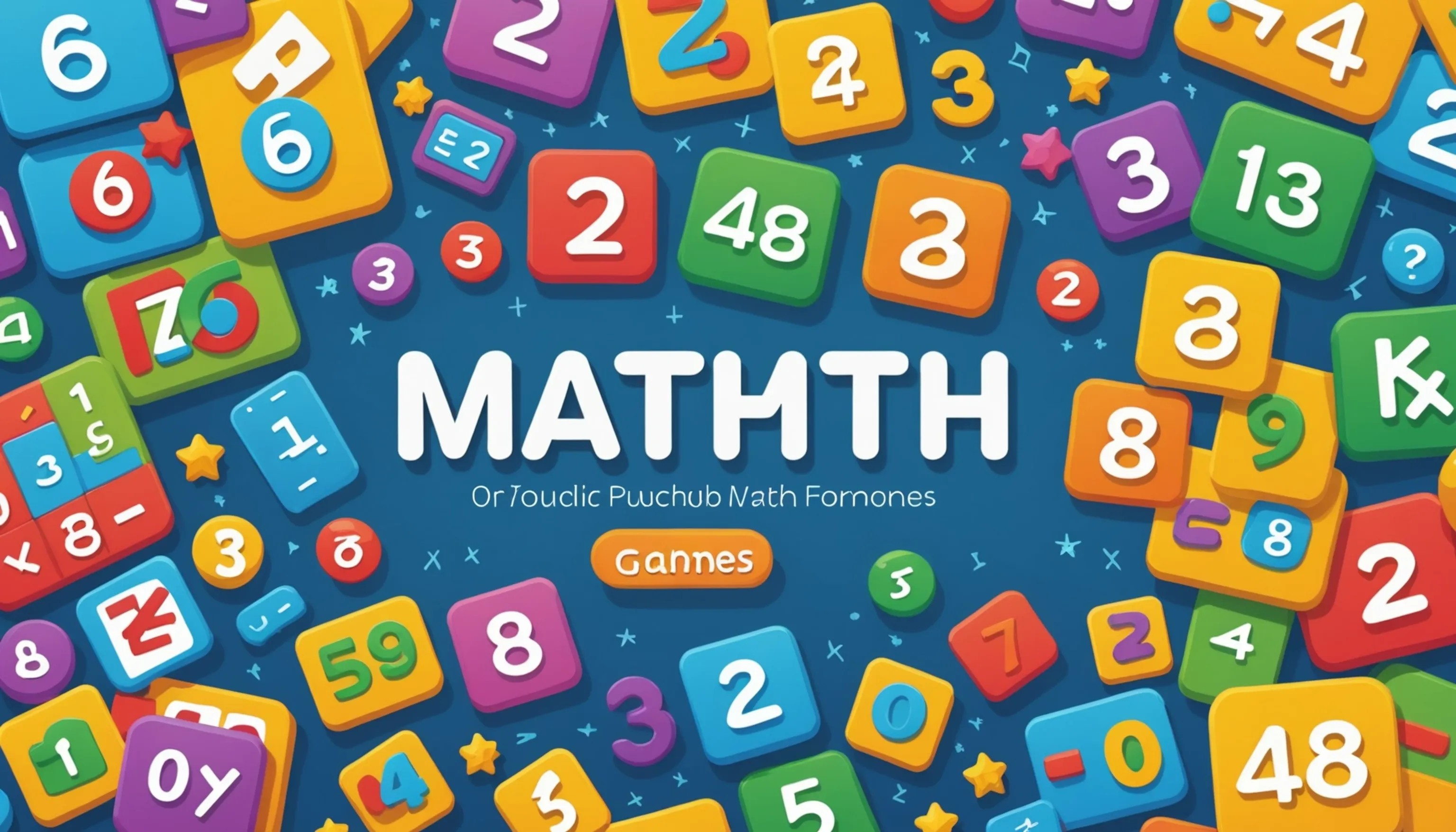Best Math Games for Learning Online
 HvWHenry van Wagenberg
HvWHenry van Wagenberg
Top Math Games for Learning Online
When it comes to enhancing math skills, online games can be both fun & effective. Here are some of the top math games for learning online:
- Khan Academy: Offers a vast range of engaging math challenges across different topics.
- Prodigy Math: Combines adventure-based learning with curriculum-aligned math problems.
- Math Playground: Features interactive activities and puzzles that cater to various skill levels.
- Coolmath Games: Provides a variety of logic-based games that make math enjoyable.
These games not only make learning enjoyable but also help reinforce important math concepts.
Benefits of Online Math Games for Teens
Online math games offer numerous benefits for teens, making them an excellent tool for enhancing math skills. Firstly, these games provide a fun and engaging way to learn, transforming traditional math practice into an enjoyable experience. Teens are more likely to stay motivated when learning is gamified, which leads to improved participation.
Moreover, online math games cater to various learning styles. Visual learners can benefit from interactive graphics, while auditory learners can engage with sound effects and verbal instructions. This adaptability helps accommodate different preferences, ensuring that every teen has the opportunity to succeed.
Another significant advantage is the immediate feedback that online games provide. Teens can quickly see where they excel or struggle, allowing them to make adjustments and learn from their mistakes in real-time. This instant feedback loop fosters a growth mindset and encourages self-directed learning.
Additionally, many online math games are designed to align with school curricula, making them a valuable supplement to classroom learning. They can help reinforce concepts taught in school, making it easier for teens to understand complex topics.
Lastly, online math games often incorporate multiplayer features, allowing teens to collaborate or compete with peers. This social interaction can enhance their learning experience and build a sense of community among classmates.
Criteria for Choosing the Best Math Games
When selecting the best math games for teens, it's essential to consider several criteria to ensure an effective learning experience. First, look for games that align with the curriculum. This alignment ensures that the game covers relevant topics and reinforces what students are learning in school.
Next, assess the age appropriateness of the game. The content should be suitable for the teen’s age group, challenging enough to promote growth but not so difficult that it leads to frustration. Games that adapt to the player's skill level can provide a more personalized experience, catering to both advanced learners and those who need extra help.
Another crucial factor is the interactivity of the game. Engaging games often incorporate elements such as rewards, levels, and challenges that keep players motivated. Look for games that encourage problem-solving and critical thinking, as these skills are vital in math.
Additionally, consider the ease of use. A well-designed interface allows teens to navigate the game effortlessly, making it easier for them to focus on learning rather than struggling with technology.
Lastly, check for reviews and ratings from other users. Feedback from parents, teachers, and students can provide valuable insights into the game's effectiveness and engagement level. By considering these criteria, you can select the best math games to support your teen's learning journey.

Popular Math Games for Different Skill Levels
When it comes to math games, there are options available for every skill level. For beginners, Math Playground offers simple, interactive puzzles that make learning basic concepts enjoyable. For intermediate learners, Prodigy Math provides an adventure-based approach, allowing students to practice while exploring a fantasy world.
Advanced players can challenge themselves with Khan Academy, which offers a wide range of complex problems and engaging challenges tailored to their skill level. These popular math games cater to various abilities, ensuring that every teen can find an engaging way to enhance their math skills.
Khan Academy: Engaging Math Challenges
Khan Academy is a renowned platform that offers a wealth of resources for teens looking to enhance their math skills. The site provides a comprehensive range of engaging math challenges that cater to various grade levels, from basic arithmetic to advanced calculus. One of the standout features of Khan Academy is its personalized learning dashboard, which allows users to progress at their own pace.
As students tackle different math challenges, they receive instant feedback, enabling them to identify areas that need improvement. This immediate response helps reinforce learning and encourages students to persist in their studies. The platform employs a mastery learning approach, where students must demonstrate understanding before advancing to more complex topics. This method not only solidifies their grasp of foundational concepts but also builds confidence.
Khan Academy also offers instructional videos that break down complex problems into digestible segments. These videos are particularly helpful for visual learners, as they provide step-by-step explanations and examples. Additionally, the platform features interactive quizzes and exercises that make learning math a dynamic experience.
Another significant advantage of Khan Academy is its accessibility. All resources are available for free, making it an excellent option for students and parents seeking quality educational content without the burden of financial costs. Overall, Khan Academy stands out as a premier choice for teens seeking engaging math challenges that support their academic growth.
Prodigy Math: Adventure-Based Learning
Prodigy Math is an innovative online platform that transforms math learning into an exciting adventure. This game-based learning environment allows teens to engage in a fantasy world where they tackle math challenges to progress through various quests. By integrating educational content with captivating gameplay, Prodigy Math effectively keeps students motivated and eager to learn.
In Prodigy, players create their own characters and embark on quests that require them to solve math problems to defeat enemies and earn rewards. The game covers a wide range of topics, including basic arithmetic, geometry, and algebra, catering to different skill levels. As students play, the game adapts to their abilities, presenting challenges that are neither too easy nor too difficult, ensuring an optimal learning experience.
One of the standout features of Prodigy Math is its emphasis on mastery. Students must demonstrate understanding before moving on to more complex concepts, allowing them to build a solid foundation in math. The platform also provides detailed reports for parents and teachers, enabling them to track progress and identify areas where additional support may be needed.
Moreover, Prodigy Math fosters a sense of community by allowing students to collaborate with friends and compete in friendly challenges. This social aspect encourages teamwork and healthy competition, making math learning a shared experience. Overall, Prodigy Math combines adventure and education, making it an exceptional choice for teens looking to improve their math skills while having fun.

Math Playground: Interactive Activities and Puzzles
Math Playground is a fantastic online resource that offers a variety of interactive activities and puzzles designed to make math engaging and enjoyable for teens. This platform features a wide range of games that focus on essential math concepts, including addition, subtraction, multiplication, division, fractions, and geometry. By utilizing game-based learning, Math Playground encourages students to practice their skills in a fun and interactive environment.
One of the standout aspects of Math Playground is its diverse array of activities. The platform includes logic puzzles, problem-solving games, and even math-based challenges that require critical thinking. These games not only reinforce math skills but also help develop essential cognitive abilities like reasoning and analysis.
Furthermore, Math Playground is user-friendly, allowing students to easily navigate through different categories and select games that align with their learning objectives. The site also provides instructional videos that offer guidance on how to approach specific math problems, making it an excellent resource for both independent study and classroom use.
Additionally, the platform promotes a sense of community by allowing students to compete against friends or classmates in various challenges. This social interaction can motivate teens to improve their math skills and engage more deeply with the material.
Overall, Math Playground stands out as an excellent choice for teens seeking a dynamic and interactive way to enhance their math skills through a variety of engaging activities and puzzles.
How to Incorporate Math Games into Learning
Incorporating math games into learning can significantly enhance a teen's educational experience. Here are some effective strategies to do so:
- Set Specific Goals: Define clear learning objectives for each session. For example, focus on mastering fractions or improving multiplication skills.
- Schedule Regular Game Time: Dedicate specific times during the week for math games, making it a routine part of their study schedule.
- Combine with Traditional Learning: Use math games as a supplement to textbooks and classroom lessons. This approach reinforces concepts and makes learning more engaging.
- Encourage Group Play: Invite friends or classmates to participate in multiplayer math games. This fosters collaboration and friendly competition, making learning fun.
- Track Progress: Monitor improvements and celebrate milestones. This encourages continued engagement and motivation.
By strategically incorporating math games, you can create an enjoyable and effective learning environment for teens.
Setting Learning Goals with Math Games
Setting learning goals with math games is a powerful strategy for enhancing a teen's educational journey. Establishing clear objectives helps focus their efforts and measure progress, making learning more effective and enjoyable. Here are some steps to set meaningful learning goals using math games.
First, identify specific math skills that need improvement. This could range from mastering basic operations like addition and subtraction to more advanced concepts such as algebra or geometry. Once the areas of focus are determined, you can select appropriate math games that align with these skills.
Next, create measurable goals. For example, instead of a vague goal like "get better at math," set a specific target such as "complete five levels of a multiplication game by the end of the week." This clarity provides a roadmap for both the student and the parent or teacher.
Incorporate regular check-ins to discuss progress. This could be a weekly review of how many levels have been completed or a discussion about which concepts are still challenging. Celebrating small victories along the way can boost motivation and reinforce positive learning habits.
Finally, encourage reflection. After playing a math game, ask the teen what they learned and how they can apply that knowledge in their studies. This practice not only solidifies learning but also fosters a growth mindset, encouraging them to view challenges as opportunities for improvement.
Creating a Balanced Learning Schedule
Creating a balanced learning schedule that includes math games is essential for optimizing a teen's educational experience. A well-structured schedule helps manage time effectively while ensuring that both academic and recreational activities are incorporated. Here are some steps to create a balanced learning schedule.
First, assess the teen's current commitments, including school hours, extracurricular activities, and personal time. This assessment will provide a clear picture of available time slots for learning. Once you have this information, designate specific periods for math practice, including game time.
Next, ensure a mix of activities. For instance, allocate time for traditional study methods, such as reviewing textbooks or completing homework, alongside time for engaging math games. This combination allows for a comprehensive understanding of concepts while keeping learning enjoyable.
Incorporate breaks to prevent burnout. Short breaks between study sessions can enhance focus and retention. For example, after 30 minutes of studying, a 5-10 minute break can help recharge the mind.
Additionally, involve the teen in the scheduling process. Allow them to choose which math games to play and when, fostering a sense of ownership over their learning. This involvement can increase motivation and engagement.
Finally, regularly review and adjust the schedule as needed. Flexibility is key; if certain games or study methods aren’t effective, be open to trying new approaches. Creating a balanced learning schedule ensures that math learning remains effective and enjoyable.
